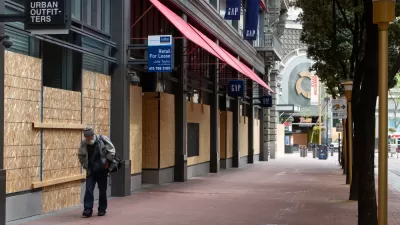In the short story The Ones Who Walk Away From Omelas, Ursula LeGuin depicts a utopia that is made possible by the transference of all misery to a child who is kept in a cellar. Some in the community ignore the scapegoat’s existence, choosing the easy life of bliss that is offered to them. Those whose consciences do not allow them to live in willful ignorance often chose to leave Omelas and live complete, full lives that include awareness, and shouldering their own pain.
In the short story The Ones Who Walk Away From Omelas, Ursula LeGuin depicts a utopia that is made possible by the transference of all misery to a child who is kept in a cellar. Some in the community ignore the scapegoat's existence, choosing the easy life of bliss that is offered to them. Those whose consciences do not allow them to live in willful ignorance often chose to leave Omelas and live complete, full lives that include awareness, and shouldering their own pain.
While utopian communities are few and far between, it is easy to spot attempts to create them: gated planned communities and economically (and, by extension, frequently racially) segregated subdivisions are the mainstay of new development. And if these neighborhoods fail at achieving their utopian ideals, they are very successful at creating circumstances that permit their denizens to ignore the conditions of other parts of the community.
In our cities, suburbs and exurbs, the child in the cellar is the low-income neighborhood. The residents bear the burdens of the community in the forms of substandard housing, lack of access to basic goods and services, and an overconcentration of polluters and toxic substances. Since these neighborhoods offer little, it is easy for those who chose to do so to ignore their existence. Simply decide not to visit the sewage treatment plant. There are no shops of worth, so don't shop there. The schools are bad; keep your children in your own neighborhood schools. Like the residents of Omelas, choose not to acknowledge the scapegoat that makes possible the quality of life you enjoy.
Planners are often the ones who have walked away from Omelas. They've gone elsewhere and are trying to create new places, wonderful places that don't rely on the child in the cellar for their success. Planners have not given up on utopian vision, but seek true utopias, utopias that don't rely on disproportionate allocations of suffering to succeed. Planners also recognize that utopias cannot be static, but must be ever responsive to a community's changing needs.
To succeed, planners must educate the public about the child in the cellar. The lack of grocery stores in low-income neighborhoods – the inability of people to feed their children because of lack of access – needs to be understood as a community-wide issue, not one that affects only those in the underserved neighborhood. Inclusionary housing requirements should be implemented with intentionality, to create mixed income neighborhoods. Planning departments should work closely with economic development departments and Chambers of Commerce to ensure businesses are being recruited to serve all neighborhoods, not just those with high concentrations of wealth. Planners can help by creating incentives, such as priority permitting, for neighborhoods identified as needy.
Planners have great tools for addressing disparity. Every day brings opportunities to address these inequities. Having walked away from Omelas, our challenge is to make places that don't have cellars for scapegoats. It will mean a little more suffering for some, but also more joy for most. We can lead the way.

Alabama: Trump Terminates Settlements for Black Communities Harmed By Raw Sewage
Trump deemed the landmark civil rights agreement “illegal DEI and environmental justice policy.”

Study: Maui’s Plan to Convert Vacation Rentals to Long-Term Housing Could Cause Nearly $1 Billion Economic Loss
The plan would reduce visitor accommodation by 25% resulting in 1,900 jobs lost.

Planetizen Federal Action Tracker
A weekly monitor of how Trump’s orders and actions are impacting planners and planning in America.

Wind Energy on the Rise Despite Federal Policy Reversal
The Trump administration is revoking federal support for renewable energy, but demand for new projects continues unabated.

Passengers Flock to Caltrain After Electrification
The new electric trains are running faster and more reliably, leading to strong ridership growth on the Bay Area rail system.

Texas Churches Rally Behind ‘Yes in God’s Back Yard’ Legislation
Religious leaders want the state to reduce zoning regulations to streamline leasing church-owned land to housing developers.
Urban Design for Planners 1: Software Tools
This six-course series explores essential urban design concepts using open source software and equips planners with the tools they need to participate fully in the urban design process.
Planning for Universal Design
Learn the tools for implementing Universal Design in planning regulations.
Caltrans
Smith Gee Studio
Institute for Housing and Urban Development Studies (IHS)
City of Grandview
Harvard GSD Executive Education
Toledo-Lucas County Plan Commissions
Salt Lake City
NYU Wagner Graduate School of Public Service






























